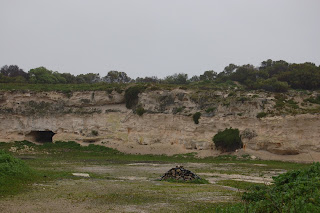Another early departure saw the group board the Ferry for the 45 minute transfer to Robben Island
The island tour had two parts,
the first being a guided tour of the prison. On entering the prison we were
greeted by a former inmate who, speaking passionately about his treatment gave a moving and frank account of the realities
of life as a prisoner. He began by
explaining about the demeaning clothing the prisoners had to wear, the strict visiting rules and the censorship applied to the various
ethnic groups and the differing prisoner categories The tour continued with a visit
to Mandela’s cell block and the gardens where he secretly stored his memoirs
prior to them being discovered, when work began on a new wall that was built to
increase the security for the political prisoners. Here we we all took the opportunity to pause and
look into the cell occupied by Nelson Mandela for the majority of the 18 years he
spent on the island.
We then gathered in a communal cell, the centre piece
being a thin mattress and a blanket placed on the floor, which for many years’
inmates slept on. Gathered around our guide, imprisoned for “crimes” of sabotage, we listened intently as
he spoke about the diet the differing ethnic groups endured and how despite all of the brutality and
difficulties the inmates, initially hostile to each other, turned this
establishment into “our own University” An education process, headed by the
likes of Mandela that turned many previously illiterate men into graduates. At the
conclusion of this tour we began a bus tour of parts of the island. Our new guide spoke eloquently about the history of the buildings and churches
and the Limestone quarry where the former inmate Nelson Mandela and many of his
co-prisoners worked daily for many years.
Unfortunately it was becoming increasingly difficult, due to the weather, to appreciate the island, its isolation and importantly its significance.
The tour concluded we re-joined
the ferry, more in trepidation than anticipation for the journey back to Cape Town
A somewhat bedraggled group then
enjoyed the comfort of the Waterfront Mall for lunch and some retail therapy.
The impact of the visit to this poignant island was somewhat diminished by the weather but its significance will remain and be perhaps enjoyed fully if any revisit the fascinating isolated place
The impact of the visit to this poignant island was somewhat diminished by the weather but its significance will remain and be perhaps enjoyed fully if any revisit the fascinating isolated place




No comments:
Post a Comment